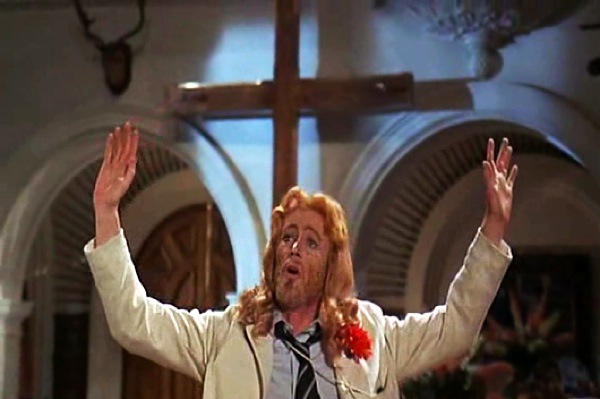 I stand outside myself, watching myself watching myself. I smile, I smile, I smile.
I stand outside myself, watching myself watching myself. I smile, I smile, I smile.
It takes courage to make a movie that defies all conventions and challenges the audience. Sometimes, indeed most of the time, the filmmakers fall on their faces. But every once in awhile a group of wildly innovative iconoclasts create something that has the right to be called unique, such as this week’s film recommendation: The Ruling Class.
The story begins with the solid, respectable, fiercely pro-Empire 13th Earl of Gurney (The always watchable Harry Andrews, holding nothing back) putting on a tutu and playing an auto-erotic asphyxiation game that goes awry. Enter greedy potential heirs, but the old coot has left his money to his manservant Tuck and his schizophrenic son Jack (Peter O’Toole). Jack currently believes himself to be the risen Christ, though after a dramatic series of events 2/3 of the way into the film he alters his self-identity in a profound fashion, with deadly results. The story barrels along with equally bizarre twists, punctuated by cast members bursting into song and doing Broadway-style dance numbers! It may sounds like an utter mess, but it’s a sublime piece of cinematic art.
As you would guess, there is a good deal of very black humour in the film. There are also many lighter-hearted laughs courtesy of Alastair Sim as a half-baked bishop (Honestly, he could evoke chuckles reading the phone book) and Arthur Lowe as the suddenly rich, alcohol-soaked Trotskyite butler Tuck, who stays on in his servant role while talking relentless smack to his “betters”.
The film is a triumph of three Peters. Peter Barnes wrote the original stage play and the screenplay, Peter Medak directed, and Peter O’Toole leads a champagne cast by giving an all out performance playing a volatile, complicated, exuberant character. Hats must also be doffed to Jack Hawkins, whose acting I have much praised in prior recommendations (e.g., The Long Arm, The Cruel Sea), and who is in the co-producer’s chair here (alongside Jules Buck).
This film did poor box office in 1972 and seemed to get no middling reviews: Critics loved it or hated it. Likewise, today, I can imagine some intelligent people of good will finding this film contrived, overlong, pretentious and maybe even obnoxious. But in other modern viewers it will evoke wonder and admiration. If you are open to something completely different, please do give it a look, particularly if you can get your hands on the stunning print available from the Criterion Collection.
Saw this when it came out (I was in high school) and haven’t seen it since. I’ve read that the “long version” improves on the theatrical release — which was impressive. O’Toole is beyond belief, in the best way; he’s on the short list of greatest eccentric performances.
Didn’t know Hawkins was a producer, bully for him! Another plus is a rare appearance by Coral Brown, Vincent Price’s longtime wife.
Thanks.
Great Movie! If you haven’t seen it watch it. O’Toole is truly incredible. My problem with it continues to be how to separate the art from the patent cultural and psychiatric pathology so that I can enjoy the former and not become totally depressed by the latter. It reminds me a bit of a pre-Thorazine, pre-Reagan mental hospital which, on the Fourth of July held a parade in which the patients were encouraged to dress up and participate consistent with the requirements of their psychopathology. Needless to say, this was a once a year event and was soon curtailed as unnecessary with the introduction of Thorazine.
Sounds like Titicut Follies
Hadn’t made that connection but you may be right. The 4th of July parade was this hospital’s “talent show” absent the egregious patient abuse that was documented in Wiseman’s 1967 film. It was 1955 and I was volunteering for the summer prior to entering graduate school. SKF was finishing up their clinical trials of chlorpromazine. Patient control was seen as an important behavioral benefit. I remember vividly being taken on a ward tour and having this pointed out to me in the form of a patient who was sitting on the floor slumped against the wall as if asleep.
When I was in university, the Drama Society did a production of “The Ruling Class”, which I enjoyed more than the film. But the film is a good laugh. Watch the fox in the hunting scene.
Though no critic, I think I may be the only person to give this a middling review. I’d give it the old L.A. Times summary for a movie that got two checks out of four: “flawed; has moments.” Its closest parallel in terms of an odd, alternately hard-and-fun-to-watch Peter O’Toole film with barely-motivated singing numbers would be “Man Friday”-but “The Ruling Class” is much better than that.
But I’ll admit that I haven’t seen it for more than twenty years, and not in the restored print that sounds like it restored some material.
Best Peter O’Toole movie ever.
Sorry, that title is awarded to My Favorite Year.
Is Lawrence of Arabia now considered chopped liver?
Ironic, but one has to decide whether to watch a particular movie before one has actually seen it.
I think I’ll give this one a miss. But thanks for sharing.
Unique and memorable, especially the final scene. Put me in the loved it camp.
I can never watch this movie beyond the first half….the second descends into darkness, albeit all too realistically human evil